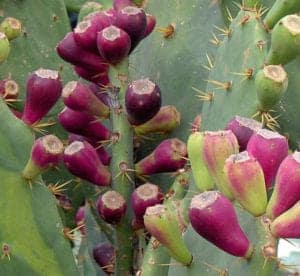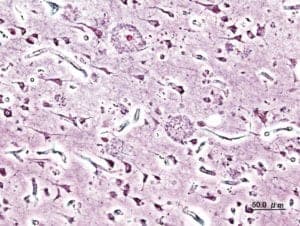Much has been written about how the Mediterranean diet has numerous health benefits for the brain, and now a study shows why that might be organically so. It’s been discovered that some plants found in that region of the world have naturally occurring chemicals that can fight Alzheimer’s and Parkinson’s disease.
Specifically, the prickly pear plant and brown seaweed are now being explored as possible remedies to combat these neurodegenerative diseases.

“We have long been screening plants scattered across the Mediterranean for small molecules that interfere with the buildup of toxic protein aggregates,” said study co-author Neville Vassallo, MD, PhD, professor of Molecular Physiology at the University of Malta School of Medicine and Surgery. “The robust effects of chemicals derived from the prickly pear and brown seaweed confirm that our search has certainly not been in vain.”
Alzheimer’s and Parkinson’s disease are identifiable within the brain by a noticeable accumulation of sticky protein clumps that damage and erode the nervous system over a period of time. So, to uncover what healing properties the prickly pear and brown seaweed plants contained, scientists conducted two tests — one on brewer’s yeast and a second on fruit flies.
Related: Eat These Foods Instead of Meat to Help You Feel Full

In the test using brewer’s yeast which contains beta-amyloid clumps, a trademark of Alzheimer’s disease, the yeast was exposed to the plant extract chemicals. Upon exposure to them the yeast almost immediately improved.
In the trial that used fruit flies, researchers genetically modified the insects to develop Alzheimer’s symptoms. When the diseased fruit flies received regular seaweed extract treatments, their life spans increased by two days. When exposed to the prickly pear extract, they lived even longer — a total of four days. When keeping in mind that a day in the life of a fruit fly is equal to about one year for humans, this study yields pretty impressive results. Additionally, the mobility of the diseased flies was greatly improved after treatment by 18 percent.
Related: 5 Spices With Brain Health Benefits
The plant extracts were also able to extend the lives of flies that had their brains oversaturated with alpha-synuclein, the gummy protein at the root of Parkinson’s disease. Because the prickly pear and brown seaweed disrupted the buildup of both the beta-amyloid and alpha-synuclein proteins, and created clumps that were less toxic to neurons, the research concluded that both plants are useful in combating both Alzheimer’s and Parkinson’s disease.

If the findings stay consistent in future trials, then the fact that these plant extracts are effective in fighting these neurodegenerative conditions could be transformative in helping to extend human life. And researchers say that some consumers are already familiar with these safe plant extract ingredients, because they can already be found in products derived from food sources as well as cosmetics.
“We believe that the discovery of bioactive agents that target pathways that are hit by multiple neurodegenerative conditions is the most viable approach in our current fight against brain disorders,” said the study’s lead author Ruben J. Cauchi, PhD, a faculty member at the Centre for Molecular Medicine and Biobanking of the University of Malta. “A clear advantage of the drugs used in this study is that, in view of their excellent safety profile, they are already on the market as nutraceuticals and cosmeceuticals.”
Ronke Idowu Reeves is a writer and journalist who hails from Brooklyn, NY. Her news and entertainment stories have appeared on WABC-TV-New York, Fox News Channel, VH1, BET.com plus in Sundance Film Festival’s Sundance Daily Insider and People Magazine.


![How To: ‘Fix’ Crepey Skin [Watch]](https://cdn.vitalupdates.com/wp-content/uploads/2017/05/bhmdad.png)












